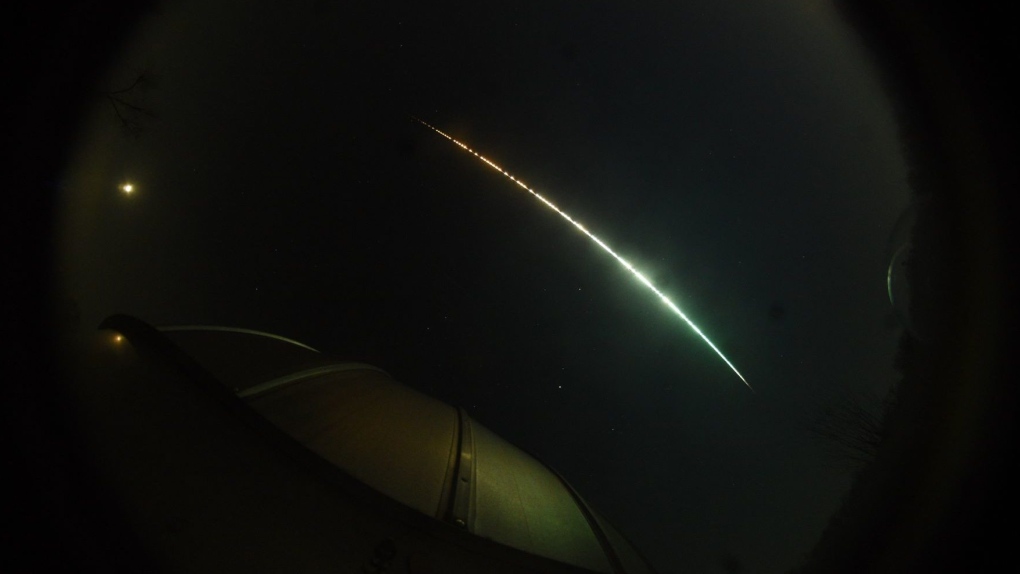Western researchers document the sixth ever asteroid spotted prior to impact
 (Source: Nazarii Neshcherenskyi/iStock/Getty Images Plus)
(Source: Nazarii Neshcherenskyi/iStock/Getty Images Plus)
Researchers at Western University that documented a 2022 fireball over southwestern Ontario have made history as having studied the smallest asteroid documented to date.
Scientists determined the composition and size of Asteroid 2022 WJ1 as it streaked across the night sky, before it fractured while entering earth’s atmosphere and dropped meteorites in the Niagara region.
Only the sixth asteroid ever discovered prior to impact, the space rock responsible for all the fuss was a mere 40-60 cm in diameter.
“Our new approach, discovering an asteroid through space observation and then subsequently observing it with cameras from the ground, allowed us to confirm that our estimates match well to estimates derived using a completely different approach,” said Denis Vida, Western physics and astronomy adjunct professor.
 A timelapse image of the fireball event from start to finish. (Source: Western Meteor Group)
A timelapse image of the fireball event from start to finish. (Source: Western Meteor Group)
The combination of camera networks, as well as telescopes allowed for a more precise understanding of the composition and size of the asteroid, which entered the atmosphere above London before streaking through the sky and splintering near St. Catharine’s.
“This is only the second time that an asteroid has been meaningfully characterized with telescopes prior to it impacting the Earth,” said Teddy Kareta, postdoctoral associate, Lowell Observatory. “This first-ever comparison between telescopic and fireball camera data is extremely exciting, and means we’ll be able to characterize the next asteroid to impact the Earth in even better detail.”
Although researchers have combed the projected area of impact for asteroid fragments, at this point none have been found – unfortunately, a large swath of the projected impact area means that much of the meteor would have landed in Lake Ontario.
“There are people in the area who are searching and know what to look for,” said Phil McCausland, a Western Earth sciences adjunct professor and Meteor Physics Group researcher. “We may still get lucky and find a meteorite or two from this fall in the coming months and years.”
CTVNews.ca Top Stories

Bird flu, measles top 2025 concerns for Canada's chief public health officer
As we enter 2025, Dr. Theresa Tam has her eye on H5N1 bird flu, an emerging virus that had its first human case in Canada this year.
Azerbaijan observes day of mourning for air crash victims as speculation mount about its cause
Azerbaijan on Thursday observed a nationwide day of mourning for the victims of the plane crash that killed 38 people and left all 29 survivors injured as speculation mounted about a possible cause of the disaster that remained unknown.
Donald Trump says he urged Wayne Gretzky to run for prime minister in Christmas visit
U.S. president-elect Donald Trump says he told Canadian hockey legend Wayne Gretzky he should run for prime minister during a Christmas visit but adds that the athlete declined interest in politics.
Thousands without power on Christmas as winds, rain continue in B.C. coastal areas
Thousands of people in British Columbia are without power on Christmas Day as ongoing rainfall and strong winds collapse power lines, disrupt travel and toss around holiday decorations.
Prayers and tears mark 20 years since the Indian Ocean tsunami that killed some 230,000 people
People gathered in prayer and visited mass graves in Indonesia’s Aceh province on Thursday to mark 20 years since the massive Indian Ocean tsunami hit the region in one of modern history’s worst natural disasters.
New York taxi driver hits 6 pedestrians, 3 taken to hospital, police say
A taxicab hit six pedestrians in midtown Manhattan on Wednesday, police said, with three people — including a 9-year-old boy — transported to hospitals for their injuries.
Historical mysteries solved by science in 2024
This year, scientists were able to pull back the curtain on mysteries surrounding figures across history, both known and unknown, to reveal more about their unique stories.
Ho! Ho! HOLY that's cold! Montreal boogie boarder in Santa suit hits St. Lawrence waters
Montreal body surfer Carlos Hebert-Plante boogie boards all year round, and donned a Santa Claus suit to hit the water on Christmas Day in -14 degree Celsius weather.
Canadian activist accuses Hong Kong of meddling, but is proud of reward for arrest
A Vancouver-based activist is accusing Hong Kong authorities of meddling in Canada’s internal affairs after police in the Chinese territory issued a warrant for his arrest.

































